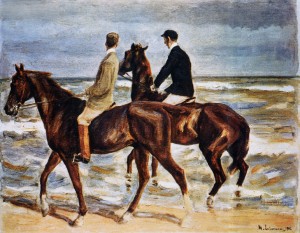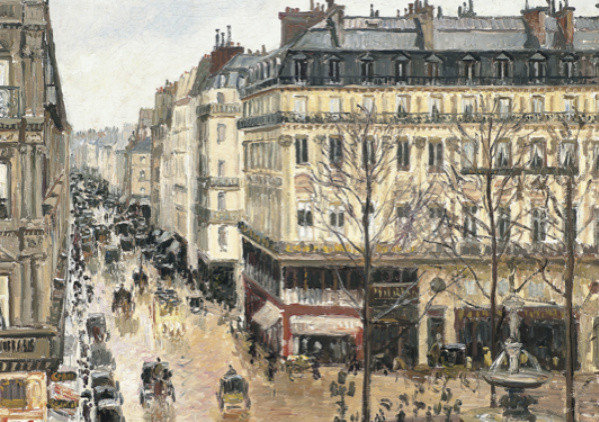Two weeks ago, the Federal Republic of Germany and Bavaria moved to dismiss the restitution claims brought by David Toren over ownership of Two Riders on the Beach (Zwei Ritter am Strand) by the German painter Max Liebermann. Toren’s uncle David Friedmann owned the painting in Breslau before he was targeted for his collection and it was stolen. Toren had not seen it since adolescence. The painting is further notable for two (related) reasons: it is among the 1,280 works of art found in Cornelius Gurlitt’s apartment in 2012, and it is one of only two that the Gurlitt Task Force has recommended be restituted (to Toren). As we noted at the time of the motion, Germany’s tactics seemed odd; Bavaria has committed to complying with the Task Force’s recommendations, and contesting this case seems to make little sense. The likeliest reason, in our view, is to try to make some jurisdictional law that will weaken other potential claimants to the Gurlitt trove.
Toren Amends Complaint Against Bavaria Over Liebermann Seized from Gurlitt, Spotlights Task Force Recommendation of Restitution in Support of Bailment Theory
Topics: Schwabinger Kunstfund, Hildebrand Gurlitt, Cornelius Gurlitt, Breslau, Max Liebermann, Germany, Silesia, Gurlitt Collection, Foreign Sovereign Immunities Act, bailment, Entartete Kunst, FSIA, Restitution, Bavaria, David Toren, Zwei Ritter am Strand, Free State of Bavaria, 28 U.S.C. § 1605(a)(2), Looted Art, World War II, Foreign Sovereign Immunities, Altmann v. Republic of Austria, Freistaat Bayern, Kunstmuseum Bern, Riders on the Beach, Federal Republic of Germany, Raubkunst, David Friedmann, Münchner Kunstfund
Bavaria and Germany Move to Dismiss Gurlitt Litigation, But Raise Questions About Why They Are Resisting a Lawsuit Over Painting that Task Force Recommended They Restitute to David Toren
To date, only one lawsuit has been filed in the United States related to the seizure from Cornelius Gurlitt’s apartment of some 1,280 works of art, a story that broke a year ago with the concern about the objects’ Nazi-looting connections via his father Hildebrand Gurlitt (the view here last winter was that the longer Germany failed to address the situation comprehensively, the more likely such U.S. litigation became). That lawsuit, brought by David Toren, seeks the return of Two Riders on the Beach (Zwei Ritter am Strand), by Max Liebermann. Germany and Bavaria moved to dismiss the case yesterday, which is particularly puzzling given that among the very few determinations made by the Gurlitt Task Force (in August), it is that the Liebermann should be returned. The cynical view is that they are looking to forestall future claims, but it is past time for the painting to be returned.
Topics: Schwabinger Kunstfund, Hildebrand Gurlitt, Cornelius Gurlitt, Breslau, Max Liebermann, Germany, Silesia, Gurlitt Collection, Foreign Sovereign Immunities Act, bailment, Entartete Kunst, FSIA, Restitution, Bavaria, David Toren, Zwei Ritter am Meer, Free State of Bavaria, 28 U.S.C. § 1605(a)(2), Looted Art, World War II, Altmann v. Republic of Austria, Freistaat Bayern, Kunstmuseum Bern, Riders on the Beach, Federal Republic of Germany, Raubkunst, David Friedmann, Münchner Kunstfund
Claims by Mendelssohn Bartholdy Heirs over Picasso "Madame Soler" Dismissed, Court Finds No FSIA Jurisdiction After Evidentiary Hearings
The U.S. District Court for the Southern District of New York has dismissed claims for ownership of Madame Soler by Pablo Picasso, currently at the Pinakothek der Moderne in Munich. Just as the relevance of Judge Jed Rakoff’s comments over another art restitution case brought by the heirs of Paul von Mendelssohn Bartholdy unexpectedly came to the fore recently, Judge Rakoff’s decision is now the most recent in a line of frustrations for the heirs of Mendelssohn Bartholdy, a victim of Nazi persecution in Berlin in the 1930s. The ramifications of this case may be fairly narrow, however, as the case was premised on allegations of specific transactions in New York rather than general allegations about the conduct of Germany. The claimants could appeal, or perhaps turn to the Limbach Commission if they could be heard (the Pinakothek is a subdivision of Germany for jurisdictional analysis, but it’s unclear at first blush if the Commission would view this claim as within its province).
Topics: Paul von Mendelssohn Bartholdy, Berlin, commercial activity exception, Cornelius Gurlitt, Florence Kesselstatt, Judge Jed Rakoff, Halldor Soehner, Saint-Jean-Cap-Ferrat, Julius Schoeps, Upper East Side, Prussia, Max Liebermann, Night Café, Gurlitt Collection, Foreign Sovereign Immunities Act, Preussen, France, State Paintings Collection, Madame Soler, Museum of Modern Art, Edelgard von Lavergne-Peguilhen, Van Gogh, Munich, Justin K. Thannhauser, FSIA, expropriation exception”, Nazi persecution, Boy Leading a Horse, Restitution, David Toren, Bayerische Staatsgemäldesammlung, Bavarian State Ministry for Education and Culture, Free State of Bavaria, World War II, Foreign Sovereign Immunities, Pinakothek der Moderne, Bayerisches Staatsministerium für Bildung und Kult, Bundesländer, Altmann v. Republic of Austria, Freistaat Bayern, Le Moulin de la Galette, Kurt Martin, München, Pablo Picasso, Federal Republic of Germany, Limbach Commission, Wissenschaft und Kunst
The Gurlitt Deal—Prosecutor Gives Collection Back, Agreement Leaves Questions About Process and Transparency
The Augsburg prosecutor for the State of Bavaria announced today that in connection with Monday’s agreement with Cornelius Gurlitt, the 1,280 works of art seized from Gurlitt’s apartment in 2012 have been “returned” to Gurlitt. Though it does not appear that the objects have physically changed locations, the state officially lifted the seizure, and now has access to the collection for further provenance research pursuant to the agreement, rather than the compulsory process by which it retrieved them.
Topics: German Ministry of Culture, Schwabinger Kunstfund, Cornelius Gurlitt, Bundesministerium für Kultur und Medien, Breslau, Augsburg, Willi Korte, London, Max Liebermann, Claude Monet, Christoph Edel, Gurlitt Collection, Ingrid Begreen-Merkel, Alt Ausee, Hildebrandt Gurlitt, stolen art, State of Bavaria, Reiter am Strand, Salzburg, Restitution, David Toren, Müncher Kunstfund, World War II, Task Force, Süddeutsche Zeitung, Freistaat Bayern, NS-beschlagnahmte Kunst, www.lostart.de, Monika Grütters, Riders on the Beach, Raubkunst, Bayerisches Staatsministerium der Justiz, Bavarian Ministry of Justice, Henri Matisse, Paul Rosenberg
Bavaria Proposes Cultural Property Restitution Act, Heads to Berlin for Federal Approval
As reported yesterday, the government of Bavaria has moved ahead with a proposal to amend the statute of limitations over art claims like those arising out of the Gurlitt find in Schwabing/Munich. The “Draft law for the exclusion of limitations on claims for misappropriated cultural property, particularly from the Nazi era (Cultural Property Restitution Law)” would bar the assertion of a statute of limitations where the current possessor does not hold the property in good faith. The draft is now publicly available, here (albeit in German). The proposal is not limited to Bavaria, rather, it is for consideration by Germany’s federal; parliament in Berlin (first the upper chamber, or Bundesrat, followed by the Bundestag).
Topics: Berlin, Ministerin für Justiz und Kultur, Cultural Property Restitution Law, veschollene Kunst, Schwabinger Kunstfund, Cornelius Gurlitt, Gurlitt Task Force, Fall Gurlitt, Gurlitt Collection, Kulturgut, Entartete Kunst, Declaration of the Federal Government the Länder a, Munich, Beutekunst, Schwabing, Bundestag, Bundesrat, Bavaria, Kulturgut-Rückgewähr-Gesetz, degenerate art, Freistaat Bayern, Justizminister, München, Raubkunst, Verjährung, Winfried Bausback
Bavaria to Review Draft Revision to Statute of Limitations on Claims to Art Found in Gurlitt Apartment
Die Welt reports today that a scheduled cabinet meeting of the government of Bavaria includes discussion of a draft revision to the state’s statute of limitations. Justice Minister Winfried Bausback (CSU) has apparently stated his desire to ensure that claimants like those heirs to owners of works found in Cornelius Gurlitt’s apartment will not be barred by the statute of limitations, following through on statements he made last year after being selected. There has been lively discussion of whether such claims would be time barred, but this revision would presumably be intended to answer the question broadly. It could signal the beginning of legislative steps to address the situation. The previous Justice and Culture Minister Beate Merk had come under heavy criticism, but a new minister may have room to make some changes. And, in a parliamentary system, the consensus of the ruling government is more significant in anticipating the passage of legislation.
Topics: Ministerin für Justiz und Kultur, Legal Tribune, veschollene Kunst, Beate Merk, Cornelius Gurlitt, Augsburg, Schwabinger Kunstfund. Kunstfund München, Gurlitt Task Force, Germany, Fall Gurlitt, Gurlitt Collection, Die Welt, Lorenz Kähler, CSU, Hildebrand Gurlit, Entartete Kunst, Ingeborg Berggreen-Merkel, Beutekunst, Magdeburg, Gurlitt, Bavaria, degenerate art, Freistaat Bayern, Justizminister, www.lostart.de, Nazi art, Raubkunst, Verjährung, Winfried Bausback
Cassirer Heirs' Claims to Pissarro Work Revived by Appeals Court, the Year 2013 Shows that the Tide for Restitution May be Shifting Again
The U.S. Court of Appeals for the 9th Circuit restored last week claims by heirs of Lilly Cassirer against the Thyssen-Bornemisza Collection for the return of the Camille Pissarro painting Rue St. Honoré, après-midi, êffet de pluie.
Topics: Nuremberg laws, Schwabinger Kunstfund, Cornelius Gurlitt, Lilly Cassirer, California Code of Civil Procedure § 338(c), Dorothy Nelson, Thyssen-Bornemisza Collection, Julius Schoeps, Rue St. Honoré après-midi êffet de pluie, Claude Cassirer, Von Saher v. Norton Simon, de Csepel, Jacques Goudstikker, California Code of Civil Procedure § 354.3, Gurlitt Collection, Foreign Sovereign Immunities Act, Hans Sachs, Von Saher v. Norton Simon Museum of Art at Pasaden, Madame Soler, Bundesgerichtshof, Hildebrand Gurlit, Entartete Kunst, Hans-Heinrich Thyssen-Bornemisza, Hungarian National Gallery, Nazis, Munich, Deutches Historisches Museum, FSIA, Preemption, Gurlitt, Harry Pregerson, Restitution, field preemption, Marei Von Saher, Herzog collection, Bavaria, Claudia Seger-Thomschitz, Looted Art, World War II, Foreign Sovereign Immunities, Pinakothek der Moderne, degenerate art, Altmann v. Republic of Austria, 578 F.3d 1016, Freistaat Bayern, beschlagnahmte Kunst, Camille Pissarro, Kim McLane Wardlaw, Nürnberger Gesetze, Raubkunst, Museum of Fine Arts Boston, Cassirer v. Thyssen-Bornemisza Collection, verschollene Kunst, Kunstfund München




